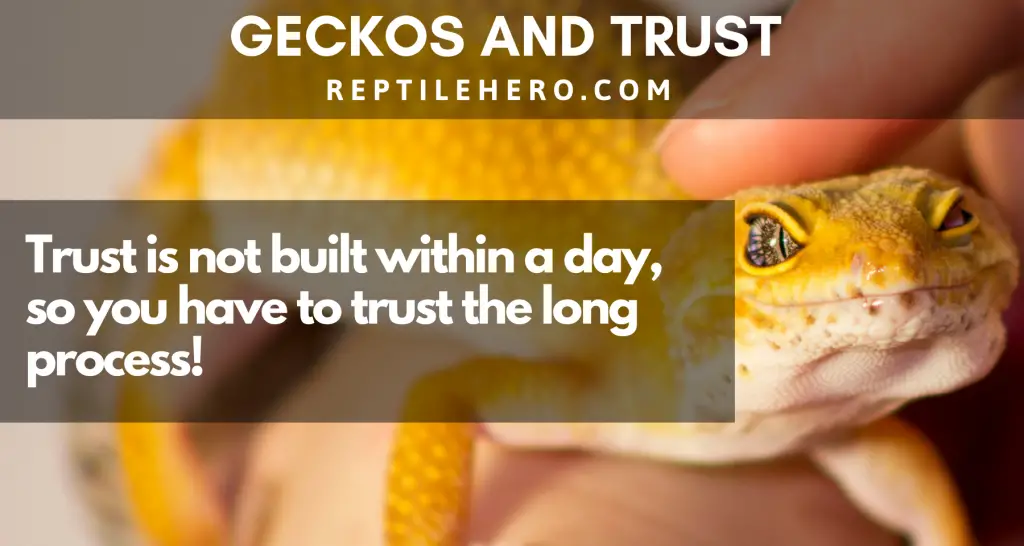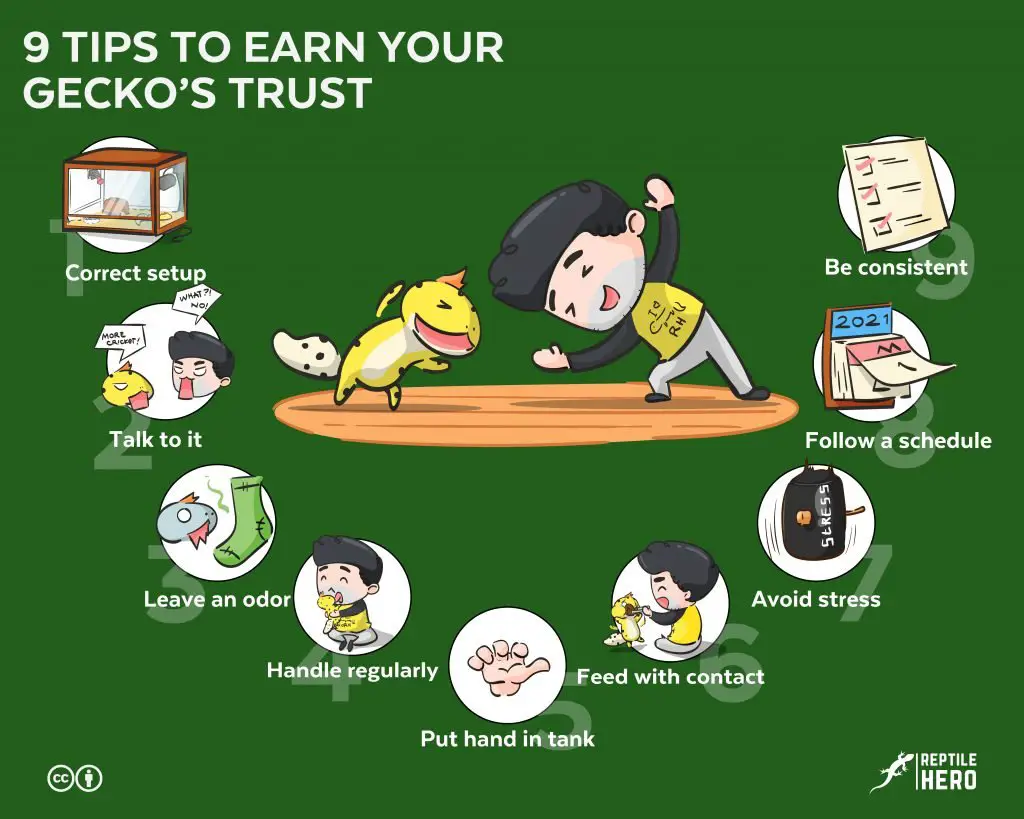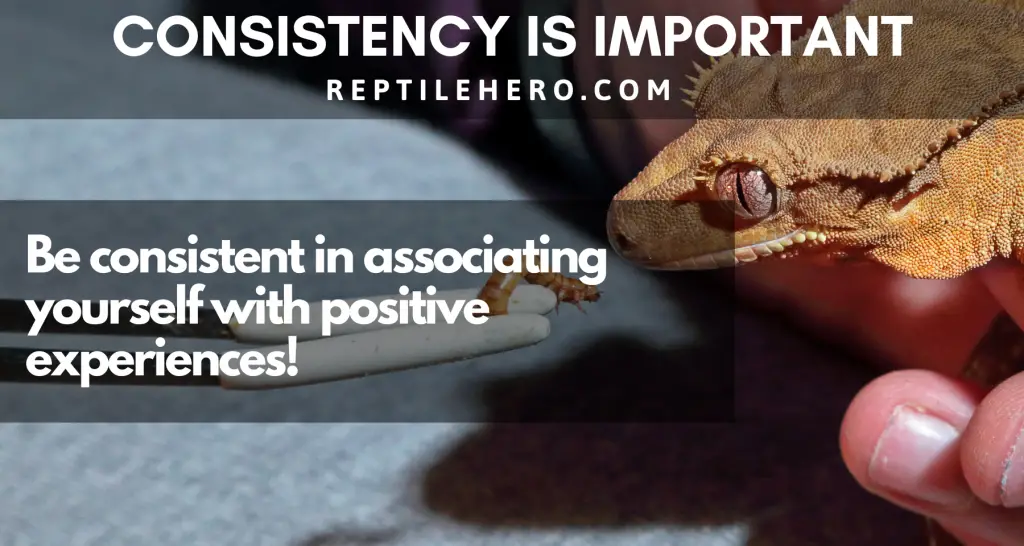Do Geckos Show Affection and Love? Myth or Truth?
After owning it for quite some time, you may start to wonder whether your gecko loves you just as much as you love it in return. You might have reached the extent of questioning, “Am I not taking good care of it?” or “Am I not a good owner to my pet?”
Leopard and crested geckos can show affections to their owners in primitive ways. This happens by positive associations with good things done by their owners, like making their body explorable for geckos to climb, jump, and hide. Petting gecko does not necessarily show affection but rather a distress.
Keep tagging along as we know more about your gecko’s acts of affection.
Do Geckos Like Being Pet? Do They Show Affection?
As with animals, including geckos, body language is the key for us to understand them. And it is tough for us to say whether they genuinely like it or just do not care at all. Even their body language does not have universal meaning.
Some of my friends would say that they may need enough time to warm themselves up. Until then, they allow us to pet them, like in the video below.
While the gecko in the video seemed to “enjoy” being pet, you have to know that closing of eyes in reptiles when being touched typically indicates stress, fear, or discomfort. Other signs that you must look out for are:
- avoiding more touch
- arching of the back
- trying to get away
- stiffening of body
- wagging of tail
Even though the gecko in the video does not look uncomfortable at all, these signs are just something you have to look out for in the future. After all, each gecko is different with unique personalities.
Some may “enjoy” gentle pets with matching closing eye reflexes, while others might just straight-out hate it. As long as you do not force them to do as you please, your gecko would still appreciate your company.
Can Geckos Become Affectionate?
If you happen to have a cat, you might know that it explicitly shows its affection by wrapping its tail around your leg or licking its tongue onto your skin.
Sadly, leopard and crested geckos do not really have that “I love you” feeling or the ability to show love to their owners in an obvious way as cats and other mammals do. That is just about it!
Geckos and Their Cold Shoulder
In general, reptiles—including leopard and crested geckos—do demonstrate basic emotions, mostly linked to fear and aggression. However, some do exhibit feelings of joy and pleasure, especially when being fed or even gently stroked [1].
While they do not form “bonds” the way we expect them to like in our cats, geckos can associate us with positive things such as feeding. Geckos might also find it enjoyable when you allow them to:
- jump around your arms or hands
- climb up your head and shoulders
- make yourself an explorable maze
- hide under your hair, sleeves, or pockets
Just relax! Even if your gecko is probably giving you the cold shoulder, it is still possible for your pet to:
- get used to your scent
- consider you not a threat
- recognize your presence
Spending years with my geckos and interacting with them on a daily basis, I have come to realize how sociable they can be.
While you see your gecko with a wholesome, smiling face, do not take this as a sign that it is showing emotions. You have to accept that your gecko does not: 1) want a snuggle from you, 2) give you surprise kisses, and 3) run to your side to comfort you in distressing times. Instead, your gecko enjoys: 1) hunting for its own food, 2) sleeping alone, 3) doing its own reptile thing, and 4) being undisturbed in its home.
So, how do you break the cold shoulder?
Trust: The Way To Your Gecko’s Heart
Are we not all pet owners who want our geckos to run happily up to our arms and rest peacefully on our shoulders? Well, you could definitely become hang-out buddies with your pet—but only if it trusts you.
Do geckos show affections immediately after adoption?
When you first get to spend time with your gecko, it views you as a threat. This is normal and part of the adaptation period.
After all, you are a giant with warm blood compared to its size. To top that off, you place it in a brand-new, unfamiliar enclosure. Voila! You have the perfect recipe to scare your pet.
If you want to create a warm atmosphere and an ideal relationship with your gecko, you must be willing to take a deal of effort essential to gain its trust. Not only would your pet confidently enjoy exploring its surroundings. But with trust, it would be comfortable for your companion.

9 Tips To Earn Your Gecko’s Trust
When you are looking for a gecko, likely, you would preferentially get a young one. Of course, you would want your pet to spend most of its lifetime under your care. This is actually fantastic as you would be able to get to know more of your gecko’s personality.
Nonetheless, building trust and forging a bond between you and your pet would be a little less challenging. For one, there is absolutely no way that I could read my gecko’s mind. But this is something I have already experienced first-hand for quite a long time.
To earn the gecko’s trust in as fast as three weeks, here are nine effective tips to follow:
- Correct setup
- Talk to it
- Leave an odor
- Handle regularly
- Put hand in the tank
- Feed with contact
- Avoid stress
- Follow a schedule
- Be consistent

Tip 1. A Homey Enclosure
If you were looking for a new apartment to move in, you would definitely choose the most comfortable one. Right? So, when it comes to your leopard or crested gecko, you must also provide it with a conducive setup that it can call home. Basically, you would want the tank’s landscape to look natural, complex with many places where it can climb, hide, and jump around.
For instance, the enclosure must have lots of places to climb or areas to hide. You might beg to differ and ask, “What is the point of having a pet if I cannot see it all the time?”
Although you want to observe your gecko as much as you can, these hiding spots actually make your pet feel safer and more secure in its home. Especially during unavoidable times that it gets freaked out, having these additional spots allows them to quickly escape and hide.
With a calm gecko that feels comfortable and safe in its home, you would indeed have less difficulty in gaining its trust!
Tip 2. Let It Hear You: Name and Sounds
Naming your gecko and using this to get its attention helps build trust. Giving your pet a name may be one of the things you are most excited about. But giving a name is not enough. You have to be consistent with using that name to call your gecko.
One good way that I really find compelling is when you feed it. You can try to gradually incorporate its name gently. By instinct, it would nab on the food. This I believe your gecko could still associate that its name corresponds to a positive experience!
Though no strict amount of time when your pet finally recognizes its name, this is something that you must really stick with. Eventually, you can see the fruit of your consistency.
Giving a name (and using it) might sound weird, but I have been pretty much doing this for my gecko. I recommend that you gradually start doing this immediately after getting your gecko, no matter how old it is.
Basically, you can produce your preferred noise. However, the sound I always make resembles a “tsk tsk tsk.” You may not understand what I am trying to get at, so below is a short clip to help you create one.
For instance, I typically use the sound whenever I feed them. At first, it did not quite work out well, but I gently repeated it. Until over a week or two, my geckos have steadily associated the sound with my presence. Not only that, but they have also regarded the familiar sound as feeding time—a positive experience that geckos indeed love!
The gecko of a friend has only started coming out of its hide. Even if he has it for a couple of months now, his gecko has only recently responded when its name is called. This is typical as other geckos can take way longer.
Though no strict amount of time when your pet finally recognizes its name, this is something that you must really stick with. Eventually, you can see the fruit of your consistency.
Tip 3. Leave Your Scent
Leopard and crested geckos, like most reptiles, heavily rely on their sense of smell in nature for survival. When you meet yours for the first time, naturally, it would memorize your scent as foreign. But as you spend more and more time together, it will get used to your odor.
There are a lot of ways you can go about this one, and a few of these include:
- wearing a particular scent all the time
- handling your gecko regularly with care
- placing an item with your scent in its tank
This could be a prominent piece of advice, but I still hear a lot of people saying it is news to them! So, as a reminder, this can be of help in your situation. After all, the more you expose your gecko to your scent, the faster it could give its trust to you.
Tip 4. Regular Handling With Care
Being a first-time owner of a gecko, one of your first must-have know-hows is how to properly handle your gecko. Not only should you know the correct way, but also the importance of regular handling.
Regular handling of your gecko in the proper manner helps create a bond and gain its trust. Besides, this also allows your gecko to recognize you quickly. So, by the next time you visit its tank, it would gladly accept your offer to handle it after it has linked the gentleness of your touch to a positive experience.
While you surely do not want your gecko to be suspicious of you, it would be best that you do not leave them unsupervised to other people. Someone who has never handled a gecko might hold it too firmly to restrain it from squirming and wiggling.
If you hold it roughly, it would certainly regard any person’s presence—including yours—to an adverse event. It can even drop its tail out of fear!
Tip 5. Put Hand in the Tank
Another piece of advice you can relate to Tip 4 is putting your hand in the cage often. Just a reminder before proceeding. You may only want to do this once you have already started gaining its trust. Otherwise, you may agitate or scare it, so be careful!
Without picking them up, you can let your gecko climb on you, touch you, lick you, or sniff you. Allow your pet to inspect your hand without rushing or forcing it to do so. Or else the process would hurt the trust you have already gained.
Tip 6. Bond While Feeding
Owning a gecko calls for a responsibility to feed it. But feeding your pet is more than just effortlessly dumping dusted insects or easily living behind CGD-filled bowls in the tank, then walking away without any interactions involved.
I realized how feeding can be one of the best times to bond with your geckos with my personal experience. What is more to this is that you can grab this excellent opportunity to associate yourself with the positive experience feeding has to offer. While food physically and mentally stimulates your gecko, being with it during this moment can help you gain its trust.
If you have a baby gecko, for example, you have to manually feed it every day. And staying with it throughout the feeding process is an excellent chance to somehow hasten its recognition of you. Not only that, but you can also kind of figure out your gecko’s feeding habits.
For instance, one of my geckos prefers that I must properly place the food bowl first prior to devouring the mealworms. But after getting one or two, it immediately loses its excitement and gives up. On the other hand, when I decided to tong-feed it one at a time, I noticed how it eats them all!
These are discoveries I would not have known if I were to immediately leave the food. I make sure not to overdo the hand-feeding, though. Otherwise, this could create a problem like laziness and inability to catch crickets.
Tip 7. Keep It Stress-Free
We have been speaking now and again about different ways to regard yourself with a positive experience. But this tip is a little bit different. It mainly focuses on reducing any more chances of adding unnecessary stress to your gecko, which could break your gecko’s trust.
It is not uncommon for gecko owners to own other pets like cats and dogs. And you might be one of them. I know that you also trust your cat or dogs. But I advise you not to get your gecko out along with these bigger animals. Surrounding it with other pets, especially those that are larger in size, can easily cause stress.
Other things that could cause unwanted stress to geckos are:
- poor heating
- poor husbandry
- not enough hides
- sudden loud noises
- unexpected movements
- feeder insects left in the tank
- suddenly picking up your gecko
Tip 8. Stick To A Routine
I know that having a schedule on tending to your gecko seems like making it into a bothersome duty. But it does not have to be anything super strict. In my opinion, it is undoubtedly good to respect that your gecko also needs time to sleep, especially during the day.
For one, I leave my geckos entirely in a quiet room throughout the day. I even avoid:
- handling them often
- feeding them
I would advise that you go for doing these activities as dusk or dawn approaches. I have been doing these for a couple of years now, and I noticed how effective it was. You might want to try this out as well!
Having a schedule for more than a year now, I believe my geckos have gotten used to it. With adequate and proper sleep, I noticed they seem calmer and less fearful when I am around. There were even times when I least expected them to remind me it is already feeding time!
You have to keep in mind that your leopard or crested gecko is crepuscular (active during dusk and dawn). However, some would classify them as cathemeral (active during different times of the day). But it does not really matter. Being around it in the middle of the day is like having someone hang out with you in the middle of the night! Unpleasant, right?
So, you have to consider using a dimmer lamp in your room rather than the tank’s overhead light. It is fine if you do not see it, but it does see you even if it is dark. Doing quiet activities near its tank will give your gecko a chance to observe you. And over time, it could even grow more comfortable with your presence around!
Tip 9. Consistency Is The Key
You have to be consistent with all the previous tips I have mentioned. Especially if you own the young ones, being persistent with successfully forging the bond builds their trust in you. Though apparently, you should not overdo everything as well, so you do not stress them out.
For example, if you leave your gecko without handling for more than a week or so, chances are they would become skittish again around you once you would take them. As I have experienced, correctly handling your gecko consistently can lead to them being calm around you.
Experiment with your gecko and see what it feels most comfortable having with. If you think you have correctly done everything yet it is still skittish around you, you have no other choice but to respect its personality.

How Long Does It Take Your Gecko To Trust You?
While you are aware of how each gecko’s personality differs from one another, no one size fits all for this situation. I have heard of some people who have only spent as short as three weeks making their geckos comfortable with them. That is undoubtedly quick when you compare it to other owners who painstakingly took three to twelve months at best!
Whether you own a clingy gecko or a distant one, what is essential is that in whatever you do, you must associate yourself with a positive experience so that you could earn its trust. When doing this, you have to remember to be:
- consistent
- impartial
- patient
If things did not go right the first time, it is crucial that you do not take it too personally. And still, try your best to hang out with your pet without stressing one another.
Takeaways
Leopard and crested geckos are not capable of loving their owners as to how cats and other mammals would. Their primary emotions are driven by fear and aggression.
Even with the lack of genuine love, leopard and crested geckos are able to create a positive association with the good things done by their owners.
As an owner, the most important thing you should always do when gaining your gecko’s trust is to consistently associate yourself with its good experiences.




![Do Geckos Fart? [4 Potential Reasons]](https://www.reptilehero.com/wp-content/uploads/2021/05/why-geckos-fart-cc-768x614.jpg)


